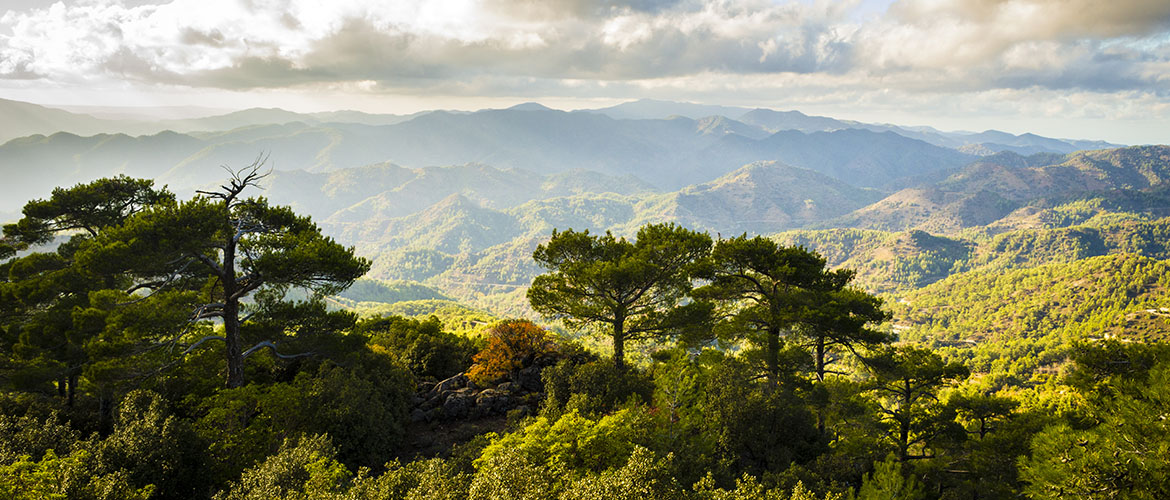Living in Cyprus

Cyprus has long been a popular tourist destination, renowned for offering an admirable quality of life that also attracts many to work and live on the island.
Often referred to as a Jewel of the Mediterranean, the island combines a rich, fascinating history with alluring beauty, glorious cuisine, and traditional hospitality that captivates the hearts of all visitors.
CLIMATE & HABITAT
Cyprus is blessed with one of the warmest climates in the Mediterranean. With an average of 320 sunny days each year, the island is an ideal year-round travel destination, enjoying long, hot summers and refreshing, mild winters.
Summer temperatures reach highs of 40 degrees between June and September, whilst the cooler months of December to February still average a pleasant 16 degrees.
An island of breathtaking beauty, Cyprus is home to 640km of coastline, hosting 66 Blue Flag beaches, an international eco-label accolade that recognizes clean, safe, and high-quality seawater.
Many of these beaches are located on the east coast of the island, in Ayia Napa and Protaras, and Cyprus has one of the highest ratios in the world of Blue Flag beaches per capita.
Set back from the coastline, towards the centre of the island is where the Troodos mountain range can be found. Reaching an altitude of 1951m and peaking at Mount Olympus, Troodos is acclaimed for its picturesque villages, winding nature trails, fragrant forest parks, and a myriad of churches and monasteries that embrace the island's history.
Those visiting in the winter months can also enjoy skiing and snowboarding, with approximately 4km of runs over 4 slopes, accommodating both beginners and experts.

CULTURE & CUISINE
First impressions count and Cyprus is no exception to the rule. First-time visitors are invariably impressed by the warm and genuine hospitality they receive, which draws them to return again and again. Along with the welcoming charm of the locals, Cyprus is also famous for its outstanding cuisine, a diverse blend of delicious dishes, influenced by Greek and Middle Eastern cultures.
A myriad of restaurants and tavernas throughout the island entice diners with healthy salads, fresh fish dishes, traditional clay oven-baked lamb, and the appetizing Tapas style Cyprus Meze. With so many options, visitors are spoilt for choice when choosing what and where to eat.
Aside from wonderful beaches, Cyprus offers a lively and varied environment, with cultural events, music concerts, wine festivals, and a multitude of dining and nightlife venues to suit all tastes and ages. Shopping malls, amusement parks, bowling alleys, cinemas, and waterparks can also be found in the main cities and resorts.
Religion plays an important role in the lives of many Cypriots with the majority of the population following the Christian Orthodox faith. Some communities follow the Muslim, Maronite, Armenian Apostolic, Anglican and Catholic faiths. There are many Orthodox churches, often several in each town, each with individual character and design. 10 of these churches feature on the UNESCO World Heritage List and are worth visiting if only to experience their grandeur and architecture.

SAFETY & HEALTH CARE
Cyprus has consistently featured highly in international rankings as a safe and secure country, with one of the lowest crime rates in the EU. This has always been a compelling element in attracting tourists, expatriates, and foreign investors to the island.
Few locations can offer the same stability and security that make Cyprus such an ideal family location.
More recently, Cyprus has been rated as one of the top countries in the world that efficiently reacted to the Covid pandemic outbreak, in terms of preparation of emergency treatment, detection, monitoring, and government handling efficiency.
The Cyprus healthcare system is of a high standard with both state-funded and private clinics located in all main towns and cities.
In 2019 a new universal national health system was implemented, known as GeSY, providing affordable and quality medical care to residents. Costs are covered by both the state and through patient contributions and members of GeSY can choose their own personal doctor and healthcare providers from both the public and private sectors.
All legal and permanent residents in Cyprus are entitled to register for and access GeSY.
The high standard and affordability of private healthcare is also an attraction for those considering Cyprus for a holiday or permanent residence.
There are over 100 private healthcare facilities on the island, including hospitals, polyclinics, diagnostic centres, and private practices.
LANGUAGE & EDUCATION
Modern Greek is the official language in Cyprus, with a blend of Cypriot dialects. English is taught throughout primary and higher education and spoken by many as a second language, which is an important advantage for English-speaking visitors and residents.
The education system in Cyprus is of an excellent standard, with the island achieving the highest percentage of university graduates per capita in the EU.
Education is divided into pre-primary, primary, secondary, and higher education, and is compulsory and free for all children aged 5-15 in public schools.
Private education is also offered at all levels at varying costs, and there are several reputable education institutions offering courses in multiple languages.
Cyprus is becoming an international regional hub for university-level education, with the number of foreign students on the island rising from 8000 to almost 30,000 in the last 10 years. The education sector currently accounts for approximately 7% of the country’s GDP.
There are six private universities, three public universities, and almost 50 private institutions offering higher education, covering a wide range of academic and technical subjects and all accredited by the Ministry of Education and Culture.
